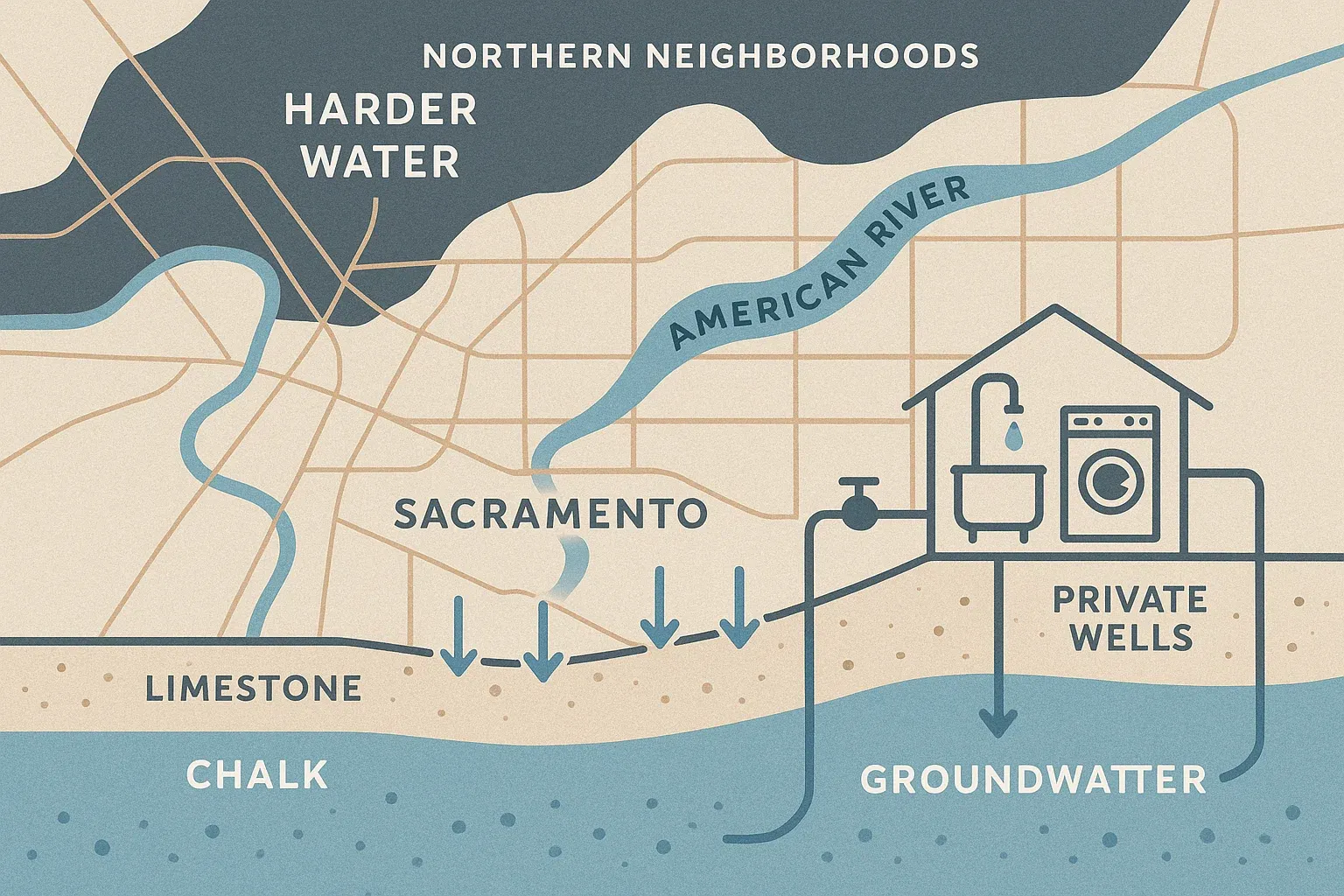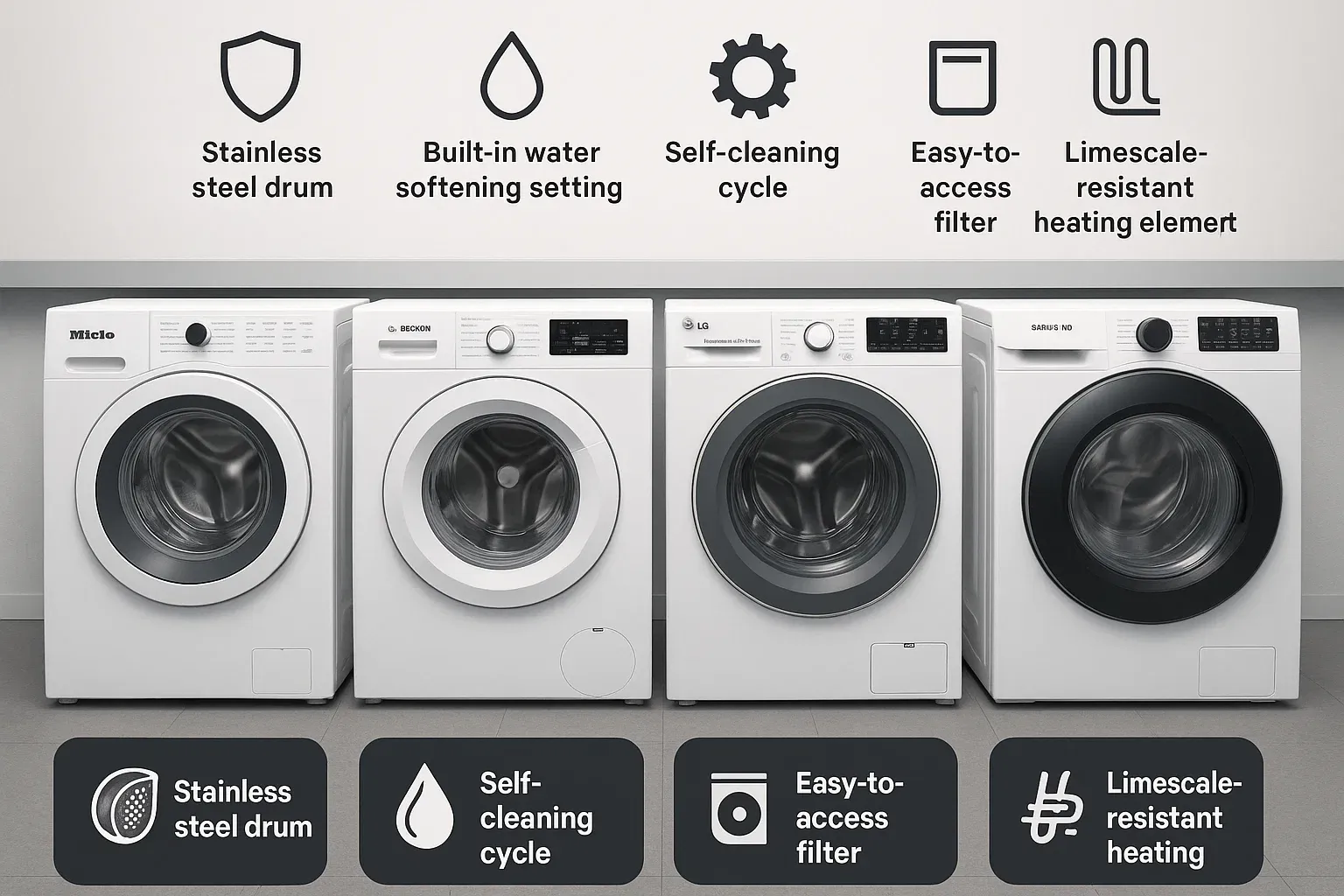Blog

Hard Water Effects on Washing Machines and How to Prevent Damage
Hard water is a major problem in homes in the Sacramento area, particularly those north of the American River. This water has high levels of minerals, particularly calcium, and magnesium, that can lead to significant issues with your washing machine and other appliances.
Rainwater seeps through Sacramento's mineral-rich dirt, collecting these minerals. When this water reaches your house, it contains roughly 121 mg/L of calcium carbonate, solidly in the "hard water" range.
Only those waters containing a substantial amount of divalent cations, such as calcium (Ca2+) and magnesium (Mg2+), need to fall, respectively, with 0.00405% and 0.016% of hard water.
Definition and Characteristics of Hard Water
Hard water isn't dangerous, but it's hard on your appliances. Here's how to identify complicated water problems:
🔸White, chalky deposits on faucets and shower heads
🔸Spots on dishes after washing
🔸Clothes feel stiff and scratchy after laundering
🔸Soap that doesn't lather well
🔸Blocked pipes lead to reduced water supply
Hard water is found in almost 85% of homes in the US, with Sacramento being one of the hardest-hit areas. These minerals disrupt cleaning products, meaning they are not as effective and require more detergent to deliver the same cleaning power.
Common Sources of Hard Water
Sacramento's hard water is primarily sourced from our groundwater. As rain drains and travels through limestone and chalk deposits in our soil, it dissolves minerals that wash into our water supply.
The city's municipal water treatment does not strip these minerals because they are not deemed dangerous to health. Which means the hard water comes into our homes through:
🔸City water supplies
🔸Private wells
🔸Groundwater sources
The US Geological Survey places Sacramento in a moderate to hard water zone, with the northern parts of the city having harder water than neighborhoods in the south.

Environmental Concentration of Hard Water
Hard water can do more than make your washing machine work harder – it affects your whole home and the environment:
🔸More energy is being consumed since appliances work more to heat mineral-rich water.
🔸It requires more detergent for cleaning, thus increasing the use of chemicals.
🔸Increased water usage as you might have to rinse clothes that do not come clean
🔸Shorter lifespans lead to more appliance replacements, which increases waste.
🔸Minerals found in deposits of mineral deposits inside pipes
For homeowners in Sacramento, these environmental costs mean higher utility bills and a bigger carbon footprint.
Impact of Hard Water on Washing Machines
Washing machines can't stand hard water, and it's hard on washing machines in several ways, all of which can shorten their lifespan and affect cleaning quality.
Mineral Buildup and Scaling
Every time she washes a load of clothes using Sacramento's hard water, the minerals go to work - accumulating limescale after countless loads. This limescale then creates a problem for other parts of the washing machine by damaging:
🔸By impeding the passage of water through its inner hoses and pipes
🔸They destroy and ruin clothing items
🔸This improves the heating efficiency by creating an insulating layer around the heating elements.
This build-up of scale is not only on the less accessible elements of machines; you can observe a white substance on the detergent dispenser and washing powder drum. This residue can also be transferred to the clothes, reducing their softness and making them look filthy.
Lower Performance and Higher Energy Usage
These minerals build up over time, and your washing machine in Sacramento must work harder for each job, which means:
🔸Instead, you need to remove the scale from your heating element surface because it uses more energy to increase the temperature on top of the scales.
🔸The water is being pushed through blocked pipes by pumps that are being strained.
🔸Motors are having to work harder to overcome the increased friction.
Due to all this extra strain, each load submitted consumes more electricity. Sacramento homeowners with hard water have seen their laundry bills increase by 25-30% compared to those with softened water.Due to the reduced water flow, clothes may not wash away thoroughly, leaving detergent behind, which could be unpleasant for the skin and create rough fabrics.
Detergent Performance Impairment
Hard water dramatically decreases the efficacy of your detergent. Sacramento's calcium and magnesium-heavy water binds with soap molecules, forming a curd-like product instead of suds. This means:
🔸You have to use up to twice as much detergent per load
🔸Clothes are not getting as clean as they should
🔸Soap residue is left on clothing after washing
🔸Over time, fabrics can lose their vibrancy or look dull.
Most Sacramento residents use almost double the recommended amount of detergent for washing clothes in hard water. A heavy-duty detergent with a low pH can help, and borax added to your laundry as a water softener is helpful.
Shortened Appliance Lifespan
The biggest dollar cost of Sacramento's hard water is a shortened life for your washing machine. According to industry studies, hard water can cut a washing machine's useful life by 30-50%.
The constant strain from:
🔸Mineral buildup on crucial components
🔸Clogged water pathways
🔸Overworked motors and pumps
🔸Damaged heating elements
All of them result in premature failure. A 10- to 12-year-life span washing machine in a Sacramento home with untreated hard water may only last 5 to 7 years. According to appliance makers, the damage done by hard water will even void your warranty — many warranties contain a specific exclusion for "scale buildup due to water quality."
Emerging Solutions to Avoid Hard Water Damage
With Sacramento's hard water, these tactics can help extend the life of your washing machine and other appliances.
Installing Water Softeners
The best solution for Sacramento houses is a whole-house water softener. These systems process calcium and magnesium before water enters appliances;
Water softeners operate through ion exchange, in which those hard minerals are swapped out for sodium, thus preventing limescale buildup. Although in the Sacramento area, installation estimates range from $800 to $2,500, savings in the life of the appliance and energy efficiency often make it a worthwhile point of investment.
The advantages of water softeners are as follows:
🔸For water-using devices other than sewing machines
🔸Better Cleaning Action of Soaps and Detergents
🔸Clothes wash feeling softer
🔸Use up to two-thirds less soap and detergent
🔸Increased appliance life by up to 40%
Check a local Sacramento cousin; their water softener paid for itself within 3-5 years in the decreased repair rates.
Using Descaling Products
If your washing machine has mineral buildup, descaling products can help dissolve existing deposits. These products are designed to break down limescale without damaging your machine's components.
For Sacramento washing machines, regular descaling is essential:
🔸Use commercial descaling products like Affresh or Lemi Shine monthly
🔸Run an empty hot water cycle with 2 cups of white vinegar as a natural alternative
🔸Follow manufacturer instructions for your specific washing machine model
Regular descaling helps maintain efficiency and prevent the compounding damage that occurs when mineral deposits are left untreated.
Selecting Hard Water-Specific Detergents
Using the right detergent can make a big difference in Sacramento's challenging water conditions:
🔸Look for detergents labeled "for hard water" or "mineral-fighting."
🔸Choose liquid detergents over powder, as they dissolve better in hard water
🔸Consider high-quality brands like Tide Heavy Duty or 9 Elements that are formulated to capture hard water minerals
🔸Use vinegar-based fabric softeners to help remove mineral residue from clothes
These specialized detergents contain ingredients that help prevent minerals from binding with the cleaning agents, allowing them to work more effectively even in Sacramento's challenging water conditions.
DIY Solutions for Hard Water Issues
There are a few do-it-yourself options for Sacramento homeowners that can protect their washing machines from complex water issues without many pipe replacements.
Regular Cleaning and Maintenance Routines
Establishing a regular cleaning routine can significantly reduce hard water damage:
🔸Monthly cleaning cycle: Run an empty hot water cycle with a commercial washing machine cleaner
🔸Weekly wipe-down: After laundry day, wipe the drum, door, and gasket dry to prevent mineral buildup
🔸Quarterly deep clean: Remove and clean detergent dispensers, check and clean filters, and inspect hoses for scale buildup
Sacramento residents should be especially vigilant about cleaning the rubber door gaskets on front-loading machines. Combined with mineral deposits, these can trap moisture and become breeding grounds for mold.
Homemade Remedies for Mineral Buildup
Several household items can help combat complex water effects:
🔸Vinegar solution: Use white vinegar in the fabric softener compartment to help prevent mineral buildup (½ cup per load)
🔸Baking soda boost: Add ½ cup of baking soda to your laundry to help detergent work better in hard water
🔸Lemon juice treatment: Run an empty wash cycle with 1 cup of lemon juice to dissolve mineral deposits
🔸Citric acid cleaner: Dissolve 3-4 tablespoons of citric acid powder in hot water and run through an empty cycle
These natural acids help dissolve the alkaline mineral deposits without harsh chemicals, making them safe for your machine and the environment.
Adjust Water Quality with Some Simple Techniques
In addition to cleaning, here are some other measures that you can take to minimize the effects of hard water:
🔸Put an inline water filter on your washing machine supply line
🔸Consider getting a magnetic water conditioner, which can help to avoid scale without the use of chemicals
🔸Use a home test kit to tell your exact Sacramento water hardness
🔸When it's finally time to replace your appliance, seek washing machines with built-in water softening.
Soft rainwater is great for washing clothes, and some of Sacramento's rainwater collectors use it to do laundry during the rainy season.
Choosing Appliances for Hard Water Regions
When it's time for residents to replace their washing machines, Sacramento residents should look for models to deal with complex water challenges.
What to Look for in Hard Water Compatible Machines
Some washing machines deal better with Sacramento's hard water:
🔸Self-cleaning cycles to minimize mineral deposits
🔸Stainless steel drums (not as prone to mineral buildup as plastic)
🔸Integrated water softening technology, such as Miele's water hardness settings
🔸Heaters with heating elements resistant to limescale
🔸Filters are easy to access and clean
🔸Maintenance reminders automated
Miele, Bosch, and some of the finest LG and Samsung models include these abilities to deal with issues with difficult water, so they are some of the best picks for houses in Sacramento.

Energy and Water Efficiency Considerations
When dealing with hard water, efficiency becomes even more critical:
🔸Look for Energy Star-certified models, which use less water and energy
🔸Consider front-loading machines, which typically use less water than top-loaders
🔸Check for adjustable water level settings to minimize water usage when possible
🔸Look for models with higher spin speeds, which extract more water and reduce drying time
While efficient models may cost more upfront, they'll save Sacramento's homeowners money over time, especially in homes with hard water where appliance efficiency can degrade more quickly.
The Real Cost of Hard Water Damage
Hard water damage is not just an inconvenience—it's a significant financial burden for Sacramento homeowners. Consider these costs:
🔸The average water damage restoration in Sacramento costs between $1,200 and $5,000
🔸Specific washing machine-related water damage repairs average $2,643 or about $13.22 per square foot
🔸Premature replacement of a washing machine can cost $700-$1,500 every 5-7 years instead of 10-12 years
🔸Energy costs increase by 25-30% for appliances affected by hard water
🔸Detergent usage nearly doubles, adding $100-$150 annually to household expenses
🔸Investing in preventative measures like water softeners or regular maintenance becomes much more economical in the long run when you factor in these costs.
We at Fair Appliance Repair Service have assisted many users in Sacramento in preserving the lifespan of their washing machines despite our region's complex water challenges. By understanding the impact of hard water on appliances and taking the necessary steps, you can enjoy clean laundry and protect your appliances from hard water damage.
Contact our team of Sacramento appliance experts today for personalized advice about your washing machine or help to address hard water damage.
























